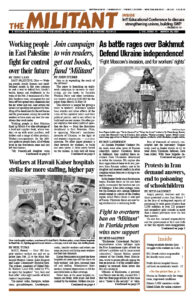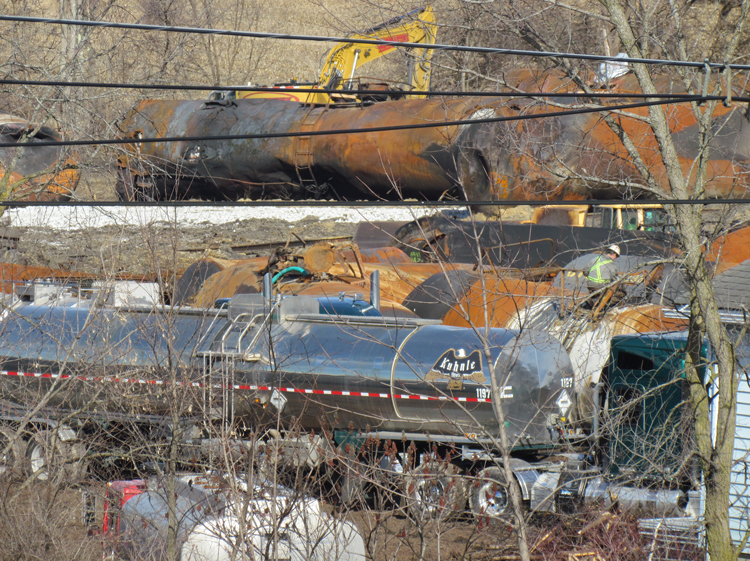EAST PALESTINE, Ohio — Working people, family farmers and small-business people in this area continue to seek a way to defend their families’ health, homes and livelihoods in the wake of the Feb. 3 derailment of a Norfolk Southern train, subsequent fire and burn-off that spread toxic chemicals into the air, water and soil. And several rail unions are speaking out against the handling of the derailment by the rail bosses and the government, raising the need for workers to have more say over the conditions they work under.
Working people in East Palestine lined up March 4 to take advantage of a food and supplies bank, where vendors set up with water purifiers, well drillers and a range of other products. Worker-correspondents for the Militant spoke to people there, all of whom lived in the evacuation zone and had left their homes.
“My 9-month-old daughter came down with a rash on her stomach, face and back,” Kayla Baker said, showing us photos on her phone. “I took her to the doctor, who said she had an allergic reaction to ‘who knows what.’”
Melissa Henry, who works from home for a doctor, said she was “most worried about the health of my two kids.” She herself has been having “nose bleeds. I’ve never had them before. I want to get my house sold, get to some place healthy. That’s what it is. My son is 12 years old; I want to make sure he’s good when he’s 20.”
They talked about what they have done to clean things up. Henry said she took the $1,000 that Norfolk Southern offered area residents and “cleaned and cleaned and cleaned. What can you do with $1,000? I’ve had to replace everything in the house. One of the things I picked up today was new pillows, I threw the old ones out.”
Henry was proud of what working people in the area had accomplished by raising their voices and demanding some action.
Workers won an important victory against Norfolk Southern and the government. The rail bosses did everything possible to get trains moving again, generating profits. They pushed for a rapid burn-off of toxic chemicals, spreading them far and wide. Then they pushed the wrecked rail cars aside, relaid the track and started running freight again.
But the outcry from area working people forced them to reverse course. The company agreed to rip up the tracks and remove the contaminated soil underneath the tracks that trains have been running on for over three weeks.
This is proof that it’s possible for workers, farmers and small-business people to organize and act collectively in their class interests. Many residents are members of unions, and the labor movement has a real presence in the area, in Youngstown, Akron, Pittsburgh and West Virginia. These unions need to be involved, along with rail workers who battle the same corporation.
“They’re going to take the dirt out. We had to fight for that. We have to fight for everything,” Henry said. “They treat us like we’re hillbillies, but they don’t know we’re not dumb hillbillies.”
Working people want to force out into the public all the “business secrets” and other information that the railroads and the government have that pertains to their safety, health and future. As mechanic Robert Anderson told the Militant here, “It shouldn’t be a mystery. We’re entitled to all the information.”
A course to fight for this means establishing committees of working people — of workers, family farmers, small-business people — to pry open the secrets of the railroads, how they make their profits, their behind-the-scene deals, and how they squander the labor power of working people.
Such committees could monitor the testing of air, water, and soil, to demand specific testing and remediation. They could fight for a permanent free medical clinic in East Palestine, paid for by Norfolk Southern, with capabilities to do blood testing, with doctors specializing in reactions to chemicals.
They could join forces with rail workers fighting to take control of their workplace out of the hands of the rail bosses. A number of rail unions have taken steps to get out the truth about the profit-driven railroad and their disdain for workers and safety.
The biggest obstacle to this course — besides the rail bosses and government officials at all levels who want to keep workers out of their affairs — is the army of lawyers who have descended on the area, smelling money.
The last thing they’re interested in is working people taking control of their own destiny. This was captured best by Rene Rocha, a lawyer from the supersize personal injury firm Morgan & Morgan. Noting the obvious, that residents “see they’re not getting the truth from the politicians and the company,” Rocha gave them one hope, “the lawyers.”
No. Working people can rely on ourselves to fight this battle.
Bosses driven by profits, not safety
Norfolk Southern is having a hard time keeping out of the news. On March 4 another of their trains derailed in Ohio, this time in Springfield. This train was even bigger than the one that went off the tracks in East Palestine, 212 cars!
Twenty cars derailed. Clark County officials ordered area residents to “shelter-in-place” while the rail bosses checked out what cars had derailed. After a day, they claimed nothing had spilled, and that people there could go out.
Peter Buttigieg, the transportation secretary in Joseph Biden’s administration, who didn’t come to East Palestine for nearly three weeks after the derailment there, assured people that “we will continue to monitor closely.”
Then on March 7 Norfolk Southern conductor Louis Shuster was hit and killed by a dump truck that collided with a train at a crossing in a steel plant in Cleveland. Shuster, 46, was president of the Brotherhood of Locomotive Engineers and Trainmen Division 607.
“This is a devastating loss for the Shuster family as well as the members of this union,” BLET National President Eddie Hall said. “All railroad accidents are avoidable. This collision underscores the need for significant improvements in rail safety for both workers and the public.”
The National Transportation Safety Board announced it was launching an investigation into Norfolk Southern’s “safety culture,” due to the “number and significance” of this death and recent derailments.
The Federal Railroad Administration reported that 42 rail workers died on duty last year, including five on the Norfolk Southern.
Track workers have been speaking out about the lack of any safety measures provided to workers ordered to East Palestine to clear and carry out repairs to the tracks. Television footage after the derailment shows Norfolk Southern track workers working without respirators or hazmat suits.
In a letter addressed to both Buttigieg and Ohio Gov. Michael DeWine, Jonathon Long, general chair of the Brotherhood of Maintenance of Way Employees, wrote, “I received reports that Norfolk Southern neither offered nor provided these workers with appropriate personal protective equipment.”
“When some of the Norfolk Southern workers inquired about the appropriateness of their personal protective equipment and the safety of their working conditions, they would receive little or no response from Norfolk Southern officials,” he added.
East Palestine resident Nelson Freeze pointed to the priorities of Norfolk Southern from his vantage point. “The first thing I saw wasn’t decontamination vehicles or heavy equipment,” he told MSN.com. “It was semitrailers loaded with preformed track and they were ready to get them trains rolling. And to me that’s criminal.”
Potential for worker-farmer alliance
There was no way the track workers could know what they were dealing with. Norfolk Southern bosses didn’t release the contents of the derailed cars for hours. Flimsy placards that identified 11 of the cars were carrying hazardous chemicals — including toxic vinyl chloride that could blow up — melted away in the fire caused by the derailment.
“We are always told that nobody is to go onto a derailment site until the ‘all clear’ is given,” Jakob Forsgren, a welder and track repair worker who works in and out of Lincoln, Nebraska, and is chair of Local 1320 of the BMWE, told the Militant. “This ‘all clear’ is the assurance from the railroad officials that the site is ‘safe’ to work in and that there is no immediate danger of fire, explosion or exposure to chemicals. The fact that the workers there to clean it up were given the ‘all clear’ and were not given respirators, or even briefed that the chemicals around the area were incredibly toxic and hazardous, is infuriating but not entirely surprising. Safety takes a back seat to profits in almost every decision made.”
One key problem with Norfolk Southern’s procedures that has been revealed concerns wayside detectors that are supposed to warn train crews if an axle bearing is getting too hot and likely to fail. Rail bosses set the temperature for an alert so high that even though an axle on the train was sparking 20 miles before it got to East Palestine, the crew didn’t get an alert until it was too late to prevent the derailment.
Stephanie Griffin, a former Union Pacific carman, responsible for inspecting rail cars for problems that might endanger the train crew and people along the tracks, told the Guardian that in 2016 her supervisor had ordered her to stop “tagging” rail cars for repair. “He refused to bad-order cars for bad wheel bearings,” Griffin said.
The bosses wanted to eliminate any delays that cut into profits. “It’s very obvious that management is not concerned with public safety,” she said.
What rail unions have brought out into the open is the stakes for rail workers, and the communities they pass through, in using their unions to get more control over what happens on the job.
Such a fight includes restoring the massive cuts in the workforce that rail bosses have carried out over the last several years, to provide for adequate maintenance, inspection and operating crews to be able to work safely. To fight for trains limited to 50 cars in length, with a crew of two on the head end and two in a caboose or engine on the rear.
“I’m for more workers on the trains,” Vern Jantzen, a farmer in Plymouth, Nebraska, told the Militant. “It was much safer for those farming near the railroad right-of-way when rail workers were riding the rear end of the train as well as on the engine.”
The potential for a fighting alliance of rail workers, other unionists, farmers and small proprietors is real.


